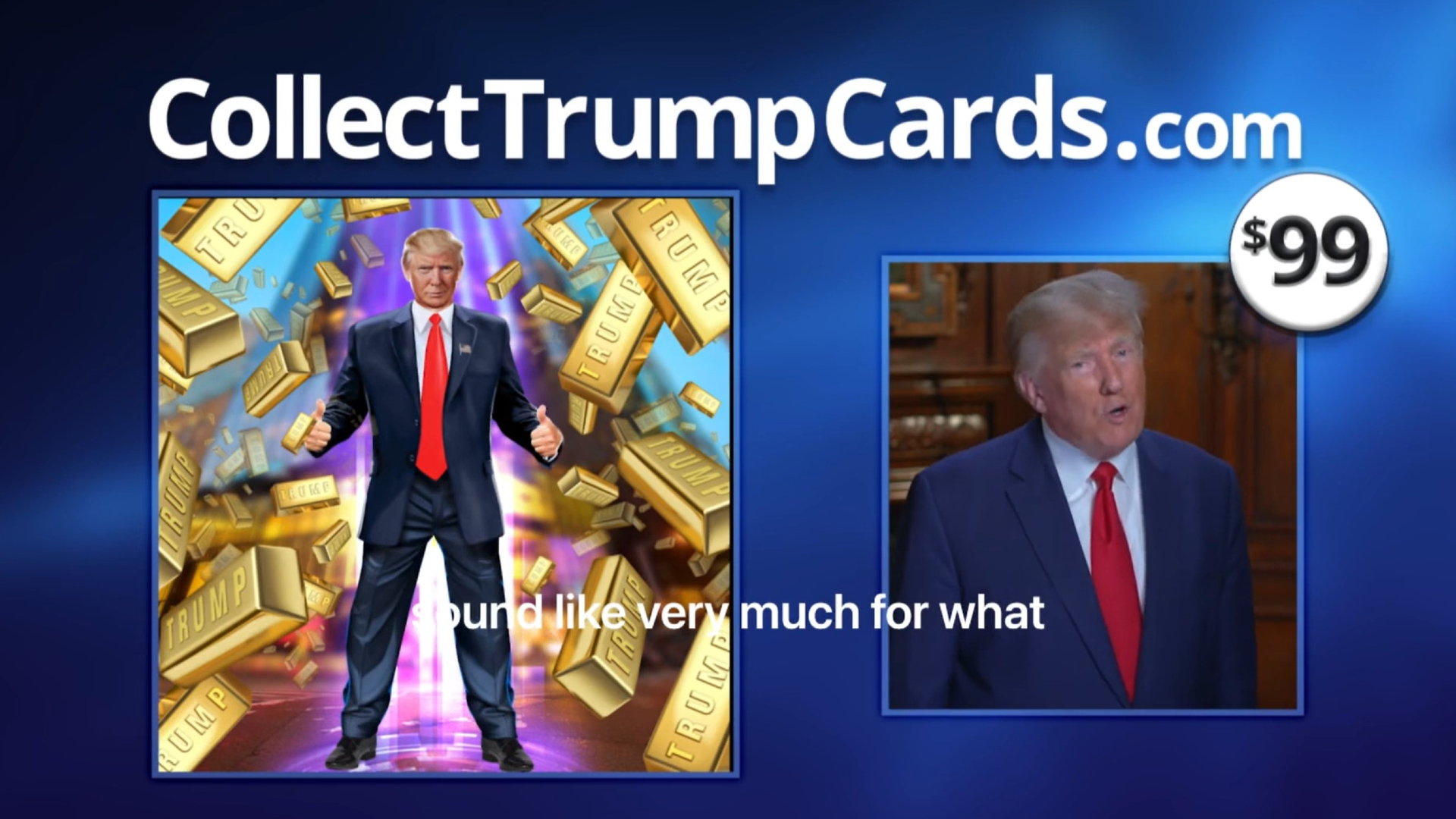Trump NFT Images Are Based on Freely Available Photos, But His Fans Bought Them Anyway

In Donald Trump’s long career of licensing his name to seemingly random products like steaks, airlines, and online courses, his launch of an online art series is surely the strangest yet.
Posting what he called a “MAJOR ANNOUNCEMENT” to his “Truth Social” website on Thursday, the disgraced ex-president urged supporters to buy “digital trading cards” of crudely made memes of himself which can be traded on cryptocurrency markets as Non-Fungible Tokens (NFTs). Some of the images, which were offered at a $99 initial price, appear to be based on copyrighted photos which may not be properly licensed.
Trump’s embrace of NFTs is a dramatic change in his attitude toward digital assets. In 2019, he derided cryptocurrencies as being “highly volatile and based on thin air” and being likely to “facilitate unlawful behavior.”
On the official website to purchase the images, the company offering them, NFT INT LLC, disclosed that Trump had only licensed his name for the product and was not affiliated with its operations. The Salt Lake Tribune reported that the contact address listed on the site was for a private mailbox in Park City, Utah. The owner of the box claimed to be unaffiliated with Trump or the NFT sales in an interview with the newspaper.
In a recorded video message to supporters, Trump hailed the artistic quality of the images, which appear to be assembled randomly and automatically by a computer program from a pre-defined collection of backgrounds, costumes, and heads, according to listings on the OpenSea NFT marketplace. According to the Collect Trump Cards website, the NFT graphics were designed by an illustrator named Clark Mitchell.
“These cards feature some of the really incredible artwork pertaining to my life and career, it’s been very exciting,” Trump said in the video, also noting that only a limited number of the virtual cards would be released. He also offered several sweepstakes incentives to people who purchased, including a dinner and a chance to speak to him on the Zoom video conference service.
Several of the paper doll-style images used in the cards appear to be barely modified copies of widely available photos seen on clothing retailer and stock photo websites.
One image of the ex-president wearing a formal tuxedo appears to have been constructed from an oversized Trump head superimposed onto a body of a model featured on the website of the clothing retailer Men’s Wearhouse.
Another image depicting Trump as a cowboy sheriff seems to be based almost entirely on a photo of a model wearing duster-style jacket made by Scully Leather that is currently available for sale at Walmart and Amazon.
A third Trump NFT showing an imaginary scene of the ex-president as a fighter pilot standing on a globe appears to be derived from an image offered for sale by the stock photo company Shutterstock. On Twitter, several users discovered that the some of the NFTs were using background images that were freely available.
NFT INT LLC did not specify whether it had paid to license the images featured in the digital cards. Trump’s campaign operations have attracted controversy in the music business several times for using songs without permission or payment at events.
Despite the low quality of the images, the initial offering of the Trump NFTs sold out, according to data viewable on OpenSea. As of this writing, 8% of the cards were listed as for re-sale, most with a price above the original $99 offering, even though a number of initial buyers said on Twitter that they were unable to access their assets.
With a limited production of 45,000 and a $99 sale price, the creators of the NFT managed to net just under $4.5 million for their efforts. Under the images’ license agreement, the creators receive 10% in perpetuity of any future secondary sales as well. Neither Trump nor NFT INT LLC has disclosed the terms of his compensation to promote the images. The company will not be offering any refunds on initial purchases, according to its website.
Mocking Trump’s virtual trading cards proved to be remarkably unifying across the political spectrum as even some of the bilious billionaire’s staunchest supporters condemned him for selling them and hyping them as a “major announcement.”
“I can’t do this anymore,” far-right podcaster and former Trump adviser Steve Bannon said on his Thursday program. “He’s one of the greatest presidents in history, but I gotta tell you: whoever–what business partner and anybody on the comms team and anybody at Mar-a-Lago – and I love the folks down there – but we’re at war. They oughta be fired today.”
Even President Joe Biden poked fun at his predecessor in a tweet in which he touted his own accomplishments in contrast to the imaginary feats depicted in the Trump NFTs.
The Good Liars, a progressive comedy duo, launched its own anti-Trump NFT called Honest Trump Cards which features equally fanciful images of the former president depicted as morbidly obese and evil.
TYT National Correspondent Matthew Sheffield reports about politics, media, and technology. Follow him on Twitter: @mattsheffield.
